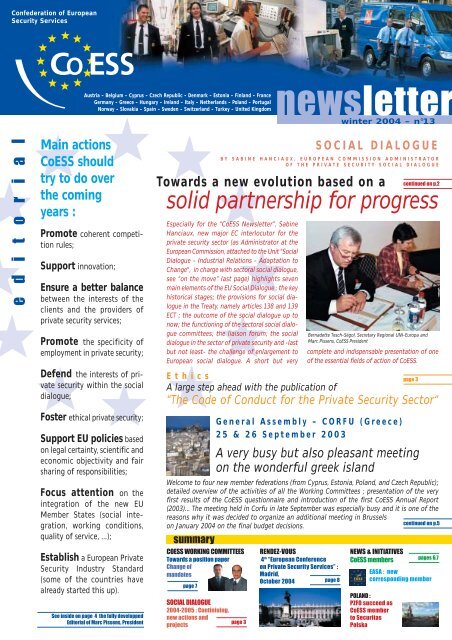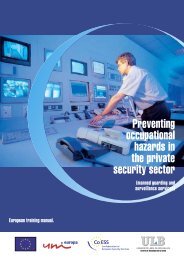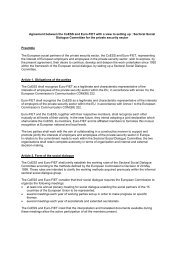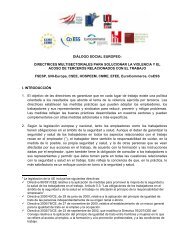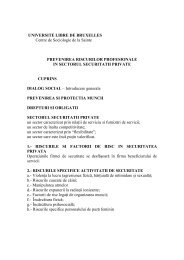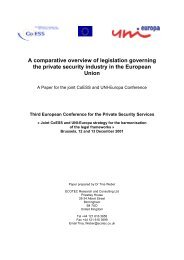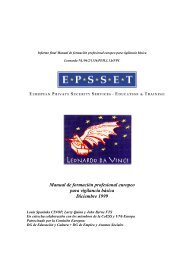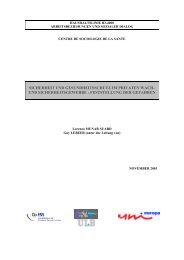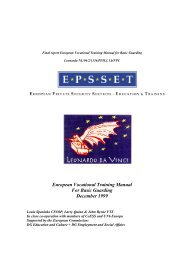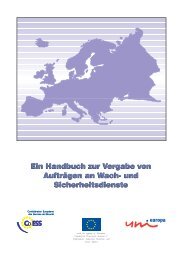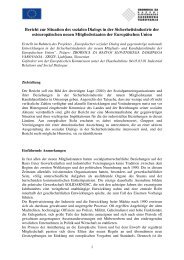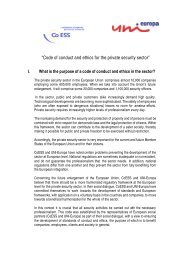social dialogue - CoESS
social dialogue - CoESS
social dialogue - CoESS
Create successful ePaper yourself
Turn your PDF publications into a flip-book with our unique Google optimized e-Paper software.
Confederation of EuropeanSecurity ServicesAustria - Belgium - Cyprus - Czech Republic - Denmark - Estonia - Finland - FranceGermany - Greece - Hungary - Ireland - Italy - Netherlands - Poland - PortugalNorway - Slovakia - Spain - Sweden - Switzerland - Turkey - United Kingdomnewsletterwinter 2004 - n°13e d i t o r i a lMain actions<strong>CoESS</strong> shouldtry to do overthe comingyears :Promote coherent competitionrules;Support innovation;Ensure a better balancebetween the interests of theclients and the providers ofprivate security services;Promote the specificity ofemployment in private security;Defend the interests of privatesecurity within the <strong>social</strong><strong>dialogue</strong>;Foster ethical private security;Support EU policies basedon legal certainty, scientific andeconomic objectivity and fairsharing of responsibilities;Focus attention on theintegration of the new EUMember States (<strong>social</strong> integration,working conditions,quality of service, …);Establish a European PrivateSecurity Industry Standard(some of the countries havealready started this up).See inside on page 4 the fully developpedEditorial of Marc Pissens, PresidentTowards a new evolution based on asolid partnership for progressEspecially for the “<strong>CoESS</strong> Newsletter”, SabineHanciaux, new major EC interlocutor for theprivate security sector (as Administrator at theEuropean Commission, attached to the Unit "SocialDialogue - Industrial Relations - Adaptation toChange", in charge with sectoral <strong>social</strong> <strong>dialogue</strong>,see “on the move” last page) highlights sevenmain elements of the EU Social Dialogue : the keyhistorical stages; the provisions for <strong>social</strong> <strong>dialogue</strong>in the Treaty, namely articles 138 and 139ECT ; the outcome of the <strong>social</strong> <strong>dialogue</strong> up tonow; the functioning of the sectoral <strong>social</strong> <strong>dialogue</strong>committees; the liaison forum; the <strong>social</strong><strong>dialogue</strong> in the sector of private security and -lastbut not least- the challenge of enlargement toEuropean <strong>social</strong> <strong>dialogue</strong>. A short but verysummaryCOESS WORKING COMMITTEESTowards a position paperChange ofmandatesSOCIAL DIALOGUE2004-2005 : Continiuing,new actions andpage 3projectsSOCIAL DIALOGUEcomplete and indispensable presentation of oneof the essential fields of action of <strong>CoESS</strong>.General Assembly - CORFU (Greece)25 & 26 September 2003A very busy but also pleasant meetingon the wonderful greek islandWelcome to four new member federations (from Cyprus, Estonia, Poland, and Czech Republic);detailed overview of the activities of all the Working Committees ; presentation of the veryfirst results of the <strong>CoESS</strong> questionnaire and introduction of the first <strong>CoESS</strong> Annual Report(2003)… The meeting held in Corfu in late September was especially busy and it is one of thereasons why it was decided to organize an additional meeting in Brusselscontinued on p.5on January 2004 on the final budget decisions.page 7BY SABINE HANCIAUX, EUROPEAN COMMISSION ADMINISTRATOROF THE PRIVATE SECURITY SOCIAL DIALOGUEEthicsA large step ahead with the publication of“The Code of Conduct for the Private Security Sector“RENDEZ-VOUS4 th “European Conferenceon Private Security Services” :Madrid,October 2004page 8NEWS & INITIATIVES<strong>CoESS</strong> membersEASA : newcorresponding memberPOLAND :PZFO succeed as<strong>CoESS</strong> memberto SecuritasPolskacontinued on p.2Bernadette Tesch-Ségol, Secretary Regional UNI-Europa andMarc Pissens, <strong>CoESS</strong> Presidentpage 3pages 6,7
<strong>social</strong> <strong>dialogue</strong>Towards a new evolution based on asolid partnership for progresscontinued from p.1The Key stages inthe european <strong>social</strong><strong>dialogue</strong>This first step towards a constructive <strong>social</strong><strong>dialogue</strong> is referred to as the "Val Duchesseprocess". This concept refers to the invitationlaunched in 1985 by JacquesDELORS to the European <strong>social</strong> partnersto cooperate with a view to improvinggrowth and employment.In 1992, the Treaty of Maastricht adoptedthe "Protocol on <strong>social</strong> policy", stipulatingthat the <strong>social</strong> partners mustbe consulted on <strong>social</strong> questions andmay negotiate framework agreementsbetween themselves. The Protocol wassigned by all EU member states apart fromthe UK.In 1997, the Treaty of Amsterdam confirmedthe fundamental role of the <strong>social</strong>partners and provided appropriate legalbasis for the <strong>social</strong> <strong>dialogue</strong>.Today, Part I of the Treaty which is discussedin the Intergovernmental Conferencelays down the basic objectivesand principles of Union membership andrecognises <strong>social</strong> <strong>dialogue</strong> as a principle ofthe Union, hence raising its status andvisibility and enshrining the promotionof open, transparent and regular <strong>dialogue</strong>with the <strong>social</strong> partners and civilsociety. This at least is one part of theTreaty which did not lead to disagreementat the December 2003 European Council.Outcome of the<strong>social</strong> <strong>dialogue</strong>The European <strong>social</strong> partners have adoptedmore than 230 joint sectoral texts andaround 40 cross-industry texts (joint opinions,declarations, recommendations).At the interprofessional level, EuropeanARTICLE 138 & 139 OF THE EC TREATYnegotiations have resulted in agreementson parental leave, part-time work,fixed-term contracts and telework. Thefirst three agreements have been translatedin directives according to article139 of the EC Treaty.However, in the past, most of these textshave not contained any provision toensure their implementation and follow-up.These agreements thereforeremain unknown, with very little disseminationat national level and with theireffectiveness subject to caution.In recent years, the <strong>social</strong> partners haveturned towards the adoption of "newgeneration" texts (charter, codes, agreements)containing commitments toimplementation in the longer term.The sectorial <strong>social</strong><strong>dialogue</strong> CommitteesThe sectoral <strong>social</strong> <strong>dialogue</strong> committeesare established with respect for theautonomy of the <strong>social</strong> partners, whoseorganisations jointly present to theEuropean Commission a request to takepart in a <strong>social</strong> <strong>dialogue</strong> at Europeanlevel. The European organisations representingemployers and workers mustmeet the following three criteria :1- belong to specific sectors or categoriesand be organised at European level;2- comprise organisations which arethemselves recognised as an integral partof the <strong>social</strong> partner structures in theMember States, and have the capacity tonegotiate agreements and be representativein a number of Member States;3- have appropriate structures enablingthem to participate effectively in theconsultation process.Under article 138 of the EC Treaty, the Commission has the duty to consult the <strong>social</strong> partnersbefore undertaking an initiative in the field of <strong>social</strong> policy.Article 138 provides for a compulsory two-stage consultation procedure:- at the first stage, the Commission consults the <strong>social</strong> partners on the possibledirection of an initiative;- whilst at the second stage, the focus is on the content of an initiative.At either stage of the consultation, the organisations may submit an opinion or a recommendationto the Commission, or may inform the Commission of their intention to opennegotiations on the subject covered in the consultation exercise.The European <strong>social</strong> partners can negotiate and conclude agreements and ask for them to beimplemented by way of Community legislation, or decide to implement them voluntarily undertheir own procedures (article 139 of the EC Treaty).If neither stage of the consultation results in a decision by the <strong>social</strong> partners to negotiatebut the Commission still considers that Community action is desirable, the Commission willundertake the preparation of a Community initiative.2Employment and Social Affairs Commissioner : Anna DIAMANTOPOULOUThe question of representativity is scrutinisedin ongoing studies which are subcontractedto the Université Catholiqueof Louvain-la-Neuve. In 2003, a studyhas been carried out on the representativityof UNI-Europa and the COESS inthe EU-15.Following the Decision of May 1998establishing the sectoral <strong>social</strong> <strong>dialogue</strong>committees, 30 committees have beenset up at the request of the <strong>social</strong> partnersin the sectors concerned. Those 30committees represent 52% of EUemployment.Liaison ForumThe various <strong>social</strong> partners at sectoraland cross-industry level meet severaltimes per year at the initiative of theCommission within the liaison forum,where they are informed and consultedon the main <strong>social</strong> policy initiatives. Thisalso provides a place to exchange experienceon themes of common interestto all sectors. The next liaison forum willbe held on 10/02/04.Social <strong>dialogue</strong> in thesector of privateindustryIn the EU, the private security is taking animportant place. More than 600,000 peoplework in almost 10,000 companieswhich specialise in the surveillance ofindustrial sites, office buildings, publicbuildings, the transport of cash andvaluables, personal protection or the protectionof homes, electronic surveillance,airport and maritime harbour security,theft prevention, etc.At informal meetings in 1993, the privatesecurity <strong>social</strong> partners asked theCommission for permission to meet regularlyin the context of a structured <strong>social</strong><strong>dialogue</strong>.The <strong>social</strong> <strong>dialogue</strong> committee wasestablished in 1999. The COESS and UNI-Europa have drawn up a number ofmajor agreements, studies and conferences:- common opinions concerning licensingfor companies in the security industry;- common opinions on vocationaltraining together with a Europeanvocational training manual for basicguarding;- the publication of a manual on theselection of best value in public procurementsof guarding services;- the publication of a handbook on thechallenges and results of the <strong>social</strong><strong>dialogue</strong> in the private security;- a joint declaration on the harmonisationof legislation governing the sectortogether with the publication of a studyon the legislative framework relatedto the work organisation of the privatesecurity sector in several EU countries;- a code of conduct and ethics.Discussions and/or studies are carriedout on major issues such as : greaterprofessionalism, modernisation of thePhoto : Médiathèque Commission Européenne
organisation of work, improvementof the sector's image and attractiveness,health and safety at thework place, cash in transit legislation,enlargement….After the successful 1996 London,1999 Berlin and 2002 Brusselsconferences, a 4th European conferenceon private security services isin preparation: "towards a Europeanmodel for private security".The challenge ofenlargementThe <strong>social</strong> <strong>dialogue</strong> forms part ofthe institutional acquis since theprocess of autonomous <strong>social</strong> <strong>dialogue</strong>is guaranteed by the Treaty.This has defined new responsibilitiesfor the <strong>social</strong> partners in thecontext of employment policy withtheir participation in the Europeanemployment strategy.Even if the acceding countries haveachieved a lot of progress in theintegration of this acquis, significantweaknesses remain. Most ofthem have organised consultationsbetween the State and the <strong>social</strong>partners within tripartite structureswhich have helped to maintainSigned, on july 2003 by<strong>CoESS</strong> and UNI-Europaafter almost two yearsof common work, the“Code of Conduct andEthics for the PrivateSecurity Sector” waspresented in September2003 in Brussels at the“EC Forum Liaison of the sectoral <strong>social</strong>Dialogue”. Aimed at raising standards andguaranteeing a high level of professional ethicsin private security firms across the EuropeanUnion, including the new Member States, “ThisCode is a clear sign that sector <strong>social</strong> partnersare willing to address the challenges in a proactiveway, in particular with a view to EUenlargement" explains Bernhard Jansen,Director at the Commission's DG forEmployment and Social Affairs, hailing thesigning.The code contains a set of basic standards of professionalismand quality which must be appliedby all employers and employees in the sector. Alla degree of <strong>social</strong> consensus,concerning the reforms carried outduring the first years of transition.However, this tripartite <strong>dialogue</strong>has not always proved very effectiveand has not led to large-scaleparticipation of the <strong>social</strong> partners.Another important difficulty is theidentification of representative andautonomous <strong>social</strong> partners.The absence of <strong>social</strong> <strong>dialogue</strong> and<strong>social</strong> partners at sectoral levelcould become a problem in thelight of enlargement: not only doesit restrict the scope of collectivebargaining, but it could also hinderthe necessary participation bythe partners from the accedingcountries in the <strong>social</strong> <strong>dialogue</strong> atCommunity level. The latter mustprepare for the sectoral <strong>social</strong> <strong>dialogue</strong>machinery at European level.In reality, the <strong>social</strong> <strong>dialogue</strong> cannotbe effective and improve theimplementation at local level ofnational and Community provisionswithout a proper linkbetween its development at thedifferent levels: sectoral, undertaking,national and regional.According to employment and<strong>social</strong> affairs Commissioner AnnaDIAMANTOPOULOU: "History hasshown what <strong>social</strong> partners andtheir representatives can achievethrough strong partnership. Overtwenty years ago, the struggleagainst totalitarianism started inthe Gdansk shipyards. Labourunions united workers and pavedthe way for some of the mostsignificant events in Europeanand world history. Now we needa new revolution. We need arevolution in our ways of thinkingabout the governance of oureconomies. And it must be arevolution which is based not onconflict, but on a solid partnershipfor progress".BY SABINE HANCIAUX, EUROPEANCOMMISSION ADMINISTRATOROF THE PRIVATE SECURITY SOCIALDIALOGUEEthicsA large step ahead with the publication of“The Code of Conduct for the Private Security Sector”firms must meet thebasic conditions imposedby national legislation,complying strictly withboth the spirit and theletter. Under the code,where there are gaps innational rules, employersand employees mustwork to improve them. The code covers a widerange of areas, ranging from the selection andrecruitment of workers and vocational trainingto health and safety at work and it includes nondiscriminationand relations with clients, thepolice and other security firms.<strong>CoESS</strong> and UNI-Europa agreed to ensure the regularfollow-up of the code, including monitoringand evaluation at company, national and EU level.They stressed that national employer and tradeunion organisations must promote the code andits application as widely and as fully as possible.The text and the agreement of the Code are availablein the section "Documents" of the <strong>CoESS</strong> website www.coess.org2004/2005Private Security Social Dialogue :continuing,new actions andprojects• Code of conduct and ethics (read detailsin special box underneath)•Project “SPOT” : Modernization of thework organization. After 6 first countries,the study probably will be extended to6 new more in 2004• Health / Safety. A report of the study hasbeen presented late December. Now theobjective is to elaborate a practicalmanual to help companies to adopt thegood practices•Manual on basic guarding. Next May,new translations will be publishedin Dutch, Danish, Swedish, Finnish, GreekPortuguese and Lithuanian• Enlargement. After having participated toa first meeting in Lithuania withUNI-Europa, <strong>CoESS</strong> was also present inSlovenia the 9 and 10 January 2004in Ljubljana at a large EC conference onSocial Dialogue in an Enlarged Europe onthe thema of “Partnership for Progress”.COESS will undertake, in 2004, theorganization of a new specific operationtowards Czech Republic, Hungary, Polandand Slovakia that may take place inBudapest.• Cash-in-transit. Launch of a synthesiscomparative study of the variouslegislations concerning the transport ofvalues in the countries of the EuropeanUnion.• Conference of Madrid : "Towards aEuropean model for the private SecurityIndustry", 14th and 15th of October,see first details page 8.•“Harmonisation of Human guardingLegislation”. Many legislative changesconcerning human guarding haveappeared in several countries. It will benecessary to engage an actualization ofthe initial study published in 2001.• Need of global Statistics on the Europeansector. The necessity of having a full andreliable report on economic data aboutthe private security sector is appearingmore and more urgent and useful. Thisproject will be very closely studied.From the first results, a specific reportwill be engaged on high risk securityfunctions especially on port and airportsector in the aim to publish a practicalmanual dedicated to guards working inthose particular and risky areas.3
e d i t o r i a lDevelopment of <strong>CoESS</strong> :“Let us apply the successful principlesof our industry“The last <strong>CoESS</strong> general meetings,which took place in Corfu on 25 and26 September 2003 (see page 5), weremarked by the continuation of thediscussions on fundamental issues for<strong>CoESS</strong> such as its future strategy andthe resources, both in human andfinancial terms, necessary to reachthose objectives. The positive outcomeof these discussions was that alarge majority of our member federationsbelieve that an increase inbudget, and therefore in annualcontributions, is a much needed butnevertheless a very serious matterwhich they felt first required in depthreflexion at national level.Also within the <strong>CoESS</strong> Board ofDirectors, discussions on this matterhave taken place and I equally hadtalks with some of the memberfederations and some CEO’s of theleading companies. It became clear,from these discussions, that prioritymust be given to the internalfunctioning of <strong>CoESS</strong> and to lobbyingthrough its own structures, keepingthe external support for lobbying andother projects at a lower level. And itis with pleasure that I can announcethat some of the major nationalfederations have already expressedtheir full support to a substantialincrease of the <strong>CoESS</strong> resources.Despite a lot of efforts already obtained(regular newsletters, meetings,creation of a website, studies andenquiries, …) there is still a hugeamount of work to be done at thenational level to inform both themembers of our national federationsand the national political decisionmakers on the activities, actions andresults by <strong>CoESS</strong>: how it contributesto job creation, to the quality of jobsand of services, to professionalism ofthe industry, to a fairer competitionand a safer society.A general atmosphere of political,religious and cultural tension buildingleads to more terrorist and criminalattacks and endangers the survivalof our industry in the long run.Governments are forced to take actionwhich compromise the growth of ourindustry and lead, amongst others, tonon insurability or premiums that aretotally unbalanced with the servicesour companies provide. In order to safeguardour future, we must work in closepartnership with the national and theEuropean authorities and define,together with these authorities, clearresponsibilities and liabilities to becarried by our industry in a balancewith our contribution to the securityclimate in general, in particular for thehigh risk areas.It is important to underline that thesediscussions take place within a frameworkand that they have strongobjectives. I would like therefore tobriefly explain what future should layahead for <strong>CoESS</strong>.What <strong>CoESS</strong> shouldtry to do over thecoming years is thefollowing:• To promote coherent competitionrules;• To support innovation;• To ensure a better balance betweenthe interests of the clients and theproviders of private security services;• To promote the specificity of employmentin private security;• To defend the interests of privatesecurity within the <strong>social</strong> <strong>dialogue</strong>;• To foster ethical private security;• To support EU policies based on legalcertainty, scientific and economicobjectivity and fair sharing of responsibilities;• To focus attention on the integrationof the new EU Member States (<strong>social</strong>integration, working conditions, qualityof service, …);• To establish a European PrivateSecurity Industry Standard (some ofthe countries have already started thisup).It goes without saying that <strong>CoESS</strong>, inorder to work towards these objectives,should have a strong basis and thenecessary means.As far as its basis is concerned, it willbe necessary to develop and deepenthe engagement of all the nationalassociations, the engagement ofthe multinational players – direct orindirect through national associations,the cooperation with other Europeantrade organisations (cleaning, temporarylabour, …), the closer linkage withPhoto : Médiathèque Commission Européenneorganisations which are sharing with<strong>CoESS</strong> similar goals and interests, suchas Euralarm, ESTA, EASA, the Ligue, and,last but not least, the permanent andconstructive sharing of informationbetween all players in our industry.It is the task of <strong>CoESS</strong> to define aplatform of common interest with ourclients and their trade associations: airports,seaports, insurance companies,nuclear industry, IT sector, communicationsector, banking sector, transportsector, ….The means which should allow thisambitious but very necessary programmemust be both internal andexternal. At the internal level, a permanentand well equipped secretariatmust be able to function in an efficientway. National associations and thesecretariat must make the right effortsin order to guarantee that time andtravel costs of the members of theworking committees are being covered.At the external level, focus should beplaced on monitoring and intelligencegathering, and on positioning andcontact building programmes.Over the last years, we have chosen togive <strong>CoESS</strong> a new direction. As theEuropean and international environmentput more and more pressure onour businesses and demand more andmore input from our sector, there is noway back. The road to take is still notclear and we will sure meet a lot ofobstacles along the way. Our industryhas always shown that it is an inventive,creative and flexible one. Let us applythe same principles to the developmentof <strong>CoESS</strong>.Marc PissensPresident4
<strong>CoESS</strong>general assemblyCorfu (Greece), 25 - 26 September 2003Budget increase :final decisions to be takenin January in Brussels<strong>CoESS</strong> has been very privileged to have been able to hold its lastgeneral meetings on the beautiful island of Corfu. Also thegood preparation of the meetings by our Greek hosts and theinteresting discussions which took place inside and outside themeeting room will make these meetings not easy to forget.As far as the work of the generalmeeting is concerned, which tookplace on 25 September 2003, fournew member federations have beenwelcomed:the Cyprus Association of SecurityCompanies, the Estonian SecurityAssociation, Securitas Polska andthe Security Club of the CzechRepublic.A detailed overview of the activitiesof all the Working Committeeshas been given, as well as an overviewof the activities from theSecretariat, a presentation of thevery first results of the <strong>CoESS</strong> questionnaireand the presentation ofthe first <strong>CoESS</strong> Annual Report(2003).The general meeting also approvedthe accounts and the financial statementof 2002 as well as theinterim financial report (1stJanuary – 31 August 2003).With regards to the budget andannual contributions 2004, the<strong>CoESS</strong> Board of Directors proposedfor 2004 a substantial increase ofthe <strong>CoESS</strong> budget and hence of theannual fees. The majority of themember federations, althoughagreeing with the basic principleof it, believed such an increase is avery serious matter which mustfirst be discussed in depth at nationallevel. They therefore decidednot to take any firm decisions inCorfu, and to first hold internal discussionsin order to explain the reasoningbehind this proposal.Several members also suggest thatexternal means of financing mustbe sought.In order to be able to determine afinal budget for 2004, it was decidedto hold in Brussels on 29January 2004 an additional GeneralMeeting.On the next day, 26 September2004, an extraordinary generalmeeting adopted some changes tothe <strong>CoESS</strong> statutes*.Corfu was also the occasion tothank two <strong>CoESS</strong> “personalities”On the behalf of <strong>CoESS</strong>, Marc Pissens warmly thanked Angel Vizcaino Ocariz andRobert Leliveld, leaving the association after a long term implicationwho said farewell to their activitieswithin <strong>CoESS</strong> but not to theindustry. On behalf of <strong>CoESS</strong>, MarcPissens, President, offered a giftas a sign of sincere thanks for alltheir past efforts and investmentsto both Angel Vizcaino Ocariz,Board member and President ofthe Working Committee Guardingand to Robert Leliveld, Member ofthe Executive Committee andTreasurer.movementClaude Lévy, from UFISS, France,holds, on an interim basis, thefunction of Treasurer precedentlyheld by Robert Leliveld* The full text of these modified Statutes is available on www.coess.orgFor a detailed report of the Corfu general meetings, please see on www.coess.org at the” Members Only” section.5
<strong>CoESS</strong> membersnews & initiativesPhoto : Médiathèque Commission EuropéenneSwitzerlandVSSU :full member of <strong>CoESS</strong>Since January 1st 2004, the Swiss Federation VSSU(ASSC – Association of Swiss Security ServiceCompanies) has become a full member of <strong>CoESS</strong>.Since the modification of the <strong>CoESS</strong> Statutes at theGeneral Meeting which took place in Corfu on 25and 26 September 2003, federations of Europeancountries not belonging to the European Union nowhave the possibility to become active <strong>CoESS</strong> Members. The VSSU, one of the mainpromoters of this important change in the Statutes, has therefore immediately usedthis new possibility and requested and obtained active membership. <strong>CoESS</strong> is pleasedwith this initiative and hopes that other federations will follow.For more information about VSSU: www.vssu.orgGÜSOD willing to become an active memberGÜSOD, Turkish federation and currently associated <strong>CoESS</strong> member, has requestedactive membership and submitted to the Board of Directors a full andexhaustive application file. After the formal positive decision by the Board,<strong>CoESS</strong> will welcome, with Switzerland (see up left), a second active memberfederation from a country which is not an EU Member State.For more information about GÜSOD: www.gusod.comGermanyTurkeySECURITY SYSTEMS AND MONITORINGORGANIZATION’S ASSOCIATIONPhoto : Médiathèque Commission EuropéennePhoto : Médiathèque Commission EuropéenneHungaryMBVMSZ : legalsuccessor of the BNSZIn 2003, the BNSZ, associated member of<strong>CoESS</strong>, decided to work towards an increaseof the number of its members. It was alsorestructured into a new association, calledthe MBVMSZ (Employers’ Association ofHungarian Security Companies). At present49 companies are a member of the MBVMSZand many more have already expressed aninterest to become a member. All membersof the former BNSZ have become membersof the MBVMSZ which can therefore be considered as the legal successorof the BNSZ. As of 31st December 2003, the BNSZ has ceased allactivities and MBVSZ is now the Hungarian associated <strong>CoESS</strong> Member.Czech RepublicTowards a jointnational delegationThe representatives of the Associationof Private Security Services of theCzech Republic and the Security Club,both members of <strong>CoESS</strong>, met twice during the autumn 2003. The purposeof their meetings was to establish a joint national delegation of privatesecurity business. The discussion resulted in a decision to form a workingcommitee for founding an integrated body.For more information visit www.asbs.cz and www.securityclub.czPhoto : Médiathèque Commission EuropéenneProjet of creating a European CEN-Norm for security servicesThe German Association BDWS will facetwo major projects in 2004. One is aneducational matter once again, theother is to start the process of developinga European CEN-Norm out of theGerman DIN-Norm.After its start in summer 2002 the recognizedprofessional training is beginningto become a success. About 700 industrialtrainees already started their educationas “Fachkraft für Schutz undSicherheit”. In spite of this developmentthe industry in Germany needs avocational training meeting a lowerstandard for present and futureemployees. Especially elder people formerlyworking in other branches will notbe willing and able to pass the high levelexamination “F.S.S”. The current examinaton“Werkschutzfachkraft” will be setout of power in 2005.The first attempt to close the gap betweenthe compulsory minimum trainingfor private security agents and theprofessional training “F. S.S”. was made bythe Chamber of Commerce and IndustryDüsseldorf. Unfortunately this conceptcannot satisfy the needs of the industryfor several reasons. The demands of thisexamination called “Certified SecurityOfficer (CCI)” are too high for the sakeof formality. That’s why the BDWS hasstarted to work out a concept that isestablished below the professional trainingquite some time ago.In cooperation with the several regionalVSW (Associations for Industrial Security)it will be one of the most importantprojects for the BDWS in 2004 to finishthis concept. Its centerpiece will be anexamination for qualified static guarding.To reach common standarts foreducational establishments the BDWSalready started in 2002 with a projectcalled “Quality-Rings”.Furtheron, the BDWS continues to workon the standardization process. With theDIN 77 200, presented in June 2002,there is for the first time the chance tovalue the quality of a security service.Whereas it was highly recognized byspecialists, the DIN did not yet reach theattempted significance in practice. Thisfact is not only caused by the generalnegative economic situation of thecustumers but also by the growing significanceof international contracts andtherefore the need of internationalstandards. Under these circumstancesthe importance of a German DIN isfading.For this reason Germany is intending toinitiate an international standardizationprocess in 2004. The aim is to create aEuropean CEN-Norm for security services.The application will be filled in thenearer future, the decision will bepassed some months from now.For more information, visitwww.bdws.de6
P olandThanks to the efforts of Securitas Polska, PZFO,the Polish Security Companies Association,will be our Polish member federationOur present <strong>CoESS</strong> associated member fromPoland, the company Securitas Polska, hassucceeded in establishing a Polish federation ofprivate security companies. The National PolishRegistration Court has offically proclaimed theregistration of the "Polish Security CompaniesAssociation - PZFO". PZFO will therefore replaceSecuritas Polska as the <strong>CoESS</strong> associated memberfrom Poland and will from now on guarantee thecontinuation of the actions engaged by SecuritasPolska. When Securitas Polska became a member of <strong>CoESS</strong> in 2003, was, according to the <strong>CoESS</strong>Statutes, entrusted with the mission of establishing a security employers association. It fulfilledthis first part of this important task in a remarkably speedy and efficient way. In a very short periodof time, the organisation associating most of the largest capital groups in the security industryin Poland, represented by 24 companies with total market share estimated at around 20 %,was established. These 24 legal entities represent now about 25.000 employees. The second partof the task is now to work towards a proven representativity status. The PZFO intentions are toachievement not less than 50% of the total outsourced security market share. The very succesfulinitiatives already undertaken by the initiative of the Securitas Polska President predict furthersuccesses in 2004.In the second half of February the first General Meeting of the PZFO shall be held and probablythe most important document Code of Ethics and Rules of Conduct for associated members shallbe approved. A press conference announcing the official launch of the Association is also scheduledfor February.With a view to the forthcoming enlargement of European Union, the Polish security employerswho have founded the PZFO have accurately identified the need to consolidate the security industryin Poland, to create a common platform for <strong>dialogue</strong> and co-operation with the trade union,and to prepare for joining the highly competitive European market. While supporting theprocess of integration in the European Union, the PZFO will set its priorities in the fields of influencingthe business environment, encouraging entrepreneurship, and shaping <strong>social</strong> policy andlegislation related to employers rights and obligations. Pawel Rafalski, already the CoEES representativefor Poland, is the first President of PZFO. Welcome and long life to the "renewed" <strong>CoESS</strong>associated member from Poland and, above all, very warm thanks to Securitas Polska for all itsefforts and previous action.Contacts : pawel.rafalski@securitas.com.pl and magdalena.stepkowska@securitas.com.pltel. (+48 22) 457 07 80 - fax (+48 22) 457 07 05EASAEuropean Aviation SecurityAssociation becomescorresponding memberEASA, the European Aviation Security Association, has become a <strong>CoESS</strong> corresponding member.EASA and <strong>CoESS</strong> have already been working closely together in the area of airportsecurity and the <strong>CoESS</strong> Working Committee dealing with this area holds its meetings togetherwith EASA. The fact that EASA is now also a <strong>CoESS</strong> member can only benefit to this already activecooperation.Founded in june 2002, gathering the leading companies (Group4Falck, ICTS, Kötter, Prosegur,Securicor, Securitas) in the businesses carrying out civil aviation surveillance and protective activitiesfor aviation industry, airlines and airports, EASA defends the interests of corporate bodiesand natural persons involved in particular in the inspection of individuals, luggage, cargo as wellas any security measures.The members of the association have agreed to apply common standards, quality managementsystems review, recruitment and selection criteria, initial training itinerary for agents,supervisor, test and verification of know-how and vigilance… All measures that focus on thestrategic objective to establish a high level of protection that requires the setting up at Europeanlevel of standards taking into account all aspects of aviation security services.Contact : EASA - Brucargo 744 - 1931 BelgiumTel. + 32 2 752 35 01 - Fax + 32 2 752 35 067Photo : Médiathèque Commission Européennecoess workingcommitteesTowards a <strong>CoESS</strong>position paperLast year it was decided that all the WorkingCommittees should start elaborating a PositionPaper. The purpose of such a paper is to presentthe activities of each Working Committee and toindicate what the stand of <strong>CoESS</strong> is on the specificfield of the industry that each WorkingCommittee is responsible for. The position papermust also dress a list of already achieved actionsand propose future actions and strategies.All Working Committees have now nearly finishedtheir position papers. After discussion,comments and input by both the <strong>CoESS</strong> generalmeeting and the board of directors, the paperswill be finalised and integrated into one general<strong>CoESS</strong> Position Paper. This document has theobjective to become for the years ahead a kindof <strong>CoESS</strong> basic manifesto from which all futureactivities will be drawn and developed.CHANGE OF MANDATESThe Working ComitteeGuarding is being presided,on an interim basis, byLuis Posadas Herrero,fromThe Working ComitteeElectronic Surveillanceis being presided,on an interim basis, byPeter Henhapl,from (Austria).(Spain).HUMAN GUARDING, President : Luis PosadasHerrero (Spain) / CASH-IN-TRANSIT, President :Raffaele MADDALONE (Italy) , Vice-President :Bernard DUMOULIN (Belgium) / ELECTRONICSURVEILLANCE, President : Peter Henhapl (Austria)AIRPORT SECURITY, President : Friedrich P.KÖTTER (Germany) / SOCIAL DIALOGUE, President:Claude LÉVY (France) / TRAINING, President : DavidDICKINSON (United Kingdom) / ENLARGEMENT,President : Stephan LANDROCK (Austria)
October 2004, Madrid4 th “European Conference on Private Security Services”Towards a European Model of Private SecurityAfter London, Berlin and Brussels,the 4 th “European Conference onPrivate Security Services” will finallytake place in Madrid, capital ofSpain, instead of Barcelona. It will beheld on 14th and 15th of October2004 under the heading “Towards aEuropean Model of Private Security”.Jointly organised by <strong>CoESS</strong> and UNI-Europa, with the active and financialsupport of the EuropeanCommission, the major generalevent of the private security industryis a professional “rendez-vous”that you must not miss. Book thedates on your diary now !<strong>CoESS</strong> is preparing for it. A steering committee -composedby <strong>CoESS</strong>, UNI-Europa, Aproser (<strong>CoESS</strong> member),the Spanish Trade Unions and the General Secretary- isalready working on ideas concerning programme, speakers,documents, etc. More news in next issues.agenda rendez-vous& nominationsPhoto : Médiathèque Commission Européenne<strong>CoESS</strong>diaryBoard meeting :28/01/2004 (Brussels)Additional General Assembly :29/01/04 (Brussels)Working Committees :- Airport Security :28/01/04 (with EASA)- Electronic Surveillance :5/02/04 (with EURALARM)Plenary Social Dialogue Session :30/01/04 (with UNI-Europa)Social Dialogue Meeting extended secretariats :13/02/04Ordinary General Assembly :13/10/04 (Madrid) to be confirmedPhoto : Médiathèque Commission Européenne16/18 May 2004, ViennaESTA Conferenceand Exhibition on CIT<strong>CoESS</strong> corresponding member ESTA, European Security TransportAssociation, will organize its next annual Conference 2004 in Viennaon May. Extraordinary and Ordinary General Assemblies will showthat the CIT association is, as <strong>CoESS</strong>, moving forward.Actually, new statutes, structures and working methods arediscussed at the Board to allow the ESTA to fully fulfil its role andto defend the interests and activities of the security transport industry within the EU.The new statutes will be submitted for adoption to the Extraordinary General Meeting inVienna. As usual, ESTA will also hold in Vienna an exhibition to help understand the latestindustry developments, technologies and services. The preview program, practical details andregistration forms will be issued on February 2004.Conference Coordinator : ESTA - Secretariat : Tel. +32 2 758 13 90 - Fax +32 2 759 43 702003 : First <strong>CoESS</strong> Annual ReportIssued last September, the first <strong>CoESS</strong> Annual Report is a veryuseful and exhaustive document that each year from 2003 willsum up all the actions engaged by the Confederation of EuropeanSecurity Services. If you wish to receive the 2003 paper edition,contact our General Secretariat in Brussels or more easily andquick load its pdf version from <strong>CoESS</strong> website : www.coess.org<strong>CoESS</strong> NewsletterPublisher & Chief Editor : Hilde De Clerck (General Secretary <strong>CoESS</strong>)Layout, Copy, Publishing : Réédition, Lyon, FrancePhotos : Médiathèque Commission Européenne, Réédition, CoeSS and members<strong>CoESS</strong> General Secretariat : Koningin Fabiolalaan 25, B-1780 WemmelTel. : +32 2 462 07 73 - Fax : +32 2 460 14 31e-mail : apeg-bvbo@i-b-s.be - www.coess.org<strong>CoESS</strong> Registered Office : 17 rue de la Croix-Nivert, F-75015 Parison themoveEUROPEAN COMMISSION,DG EMPLOYMENT AND SOCIAL AFFAIRS,Sabine HANCIAUXreplaces Rudi DelarueUNIT "SOCIAL DIALOGUE -INDUSTRIAL RELATION- ADAPTATION TO CHANGE"Previously Head of the Cabinet of the Belgian Deputy PrimeMinister, Minister of Budget and Public Enterprises incharge with public entreprises, Sabine HANCIAUX hasreplaced since November 2003, Rudi Delarue as <strong>CoESS</strong>main interlocutor at the European Commission.As new President of the Committee on <strong>social</strong> <strong>dialogue</strong> forthe sector of Private Security, that young and sportiveprofessional Administrator at the European Commission,attached to the Unit "Social Dialogue - Industrial Relations- Adaptation to Change", is also in charge with sectoral<strong>social</strong> <strong>dialogue</strong> related to trade, temporary work andindustrial cleaning. More, she assumes the followingof the <strong>social</strong> <strong>dialogue</strong> in Slovenia and the Republic ofSerbia-Montenegro, financial aspects of Corporate SocialResponsibility, fair and ethical trade labelling, representativitystudies and sectoral socio-economic analysis.Rudi Delarue who held the same job since January 2001is now working in the same DG but the Unit in charge ofenlargement and international affairs.<strong>CoESS</strong> whish both best luck in their new positions.Sabine Hanciaux :Tel: + 32 2 299 17 82 - Fax: + 32 2 299 24 66sabine.hanciaux@cec.eu.int8


